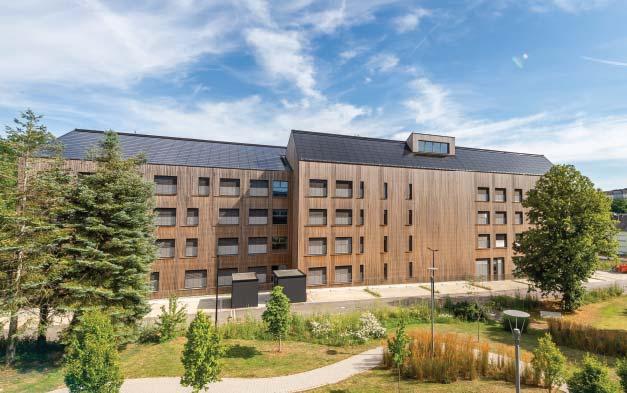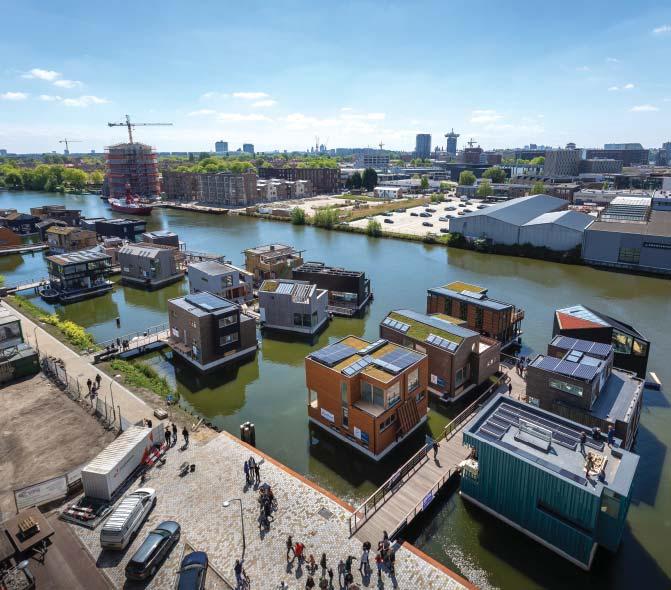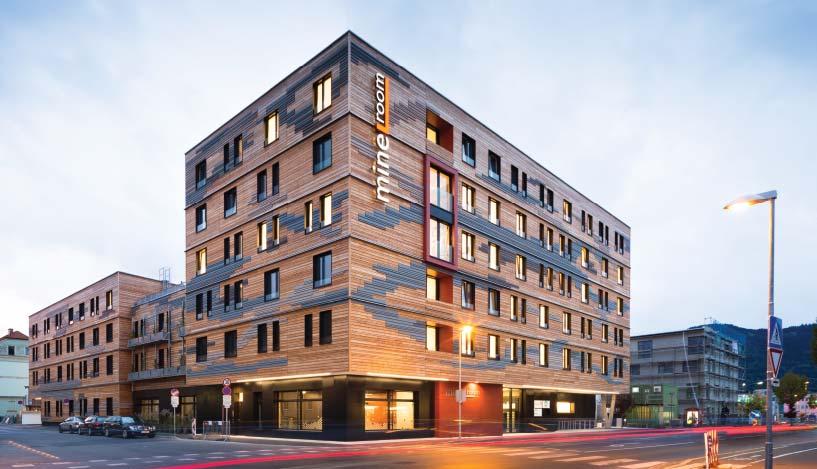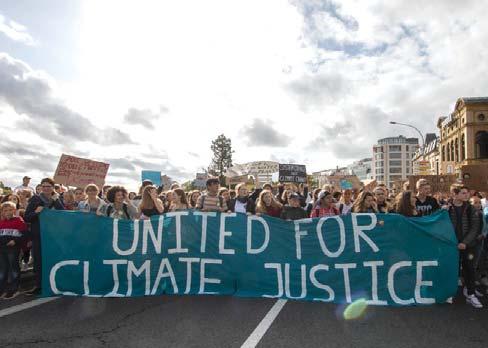
14 minute read
European Solar Prize awarded in eight categories Renewable energy pioneers recognised for innovaƟ ve projects and iniƟ aƟ ves
IN EIGHT CATEGORIES EUROPEAN SOLAR PRIZE AWARDED
Renewable energy pioneers recognised for innovaƟ ve projects and iniƟ aƟ ves.
In mid-November 2019, EUROSOLAR (European AssociaƟ on for Renewable Energies) and its Luxembourgian secƟ on honoured eight nominees from six diff erent countries with the European Solar Prize 2019, at the Campus Belval in Luxembourg’s picturesque Esch-sur-AlzeƩ e. The prize was awarded in the categories of municipaliƟ es, solar architecture, commercial companies, local or regional associaƟ ons, renewable energy installaƟ ons, educaƟ on and vocaƟ onal training, one world cooperaƟ on, and special achievement. In his welcoming address, Henri Kox, former head of EUROSOLAR Luxembourg and newly designated Minister of Housing, stated, “The Energy TransiƟ on is a major challenge for our society. It can only be achieved when we pool our eff orts and our ideas, learn from each other and work together to make lasƟ ng changes. Only then will we create a sustainable future. I welcome you all to fi nd inspiraƟ on from our renewable energy pioneers today”. In his opening speech, Prof Peter Droege, President of EUROSOLAR e V pointed out the importance of civic dedicaƟ on to the energy revoluƟ on. “I am glad that today we were able to honour people who are working on soluƟ ons for local and regional energy system transformaƟ ons. Whether it is a church, industry or youth movement, all prize winners have innovaƟ ons in common that are pracƟ cal and sustainable. Their projects serve as forward-looking examples of renewable energies in Europe”, he said. Prior to the presentaƟ on of the awards, Prof Stéphane Pallage, Rector of the University of Luxembourg, emphasised the key role universiƟ es play in the fi ght against climate change and for the energy transiƟ on. Prof Susanne SiebentriƩ , from the University of Luxembourg, gave an insight into research and development in the fi eld of renewable energy. AŌ er a lively discussion with speakers and audience, Prof Peter Droege presented the awards to the winners. The awards ceremony took place, in previous years, in Bonn, Germany, the hometown of EUROSOLAR e.V, as well as in Vienna, Barcelona and Prague. Since 1994, the prize has been awarded annually to municipaliƟ es, municipal companies, associaƟ ons and organisaƟ ons, architects, journalists and private, individuals in cooperaƟ on with the naƟ onal secƟ ons of EUROSOLAR. The award recognises the dedica Ɵ on and invenƟ veness of regional players and provides new impetus for a regeneraƟ ve and decentralised energy revoluƟ on in Europe.
Category: Towns, municipaliƟ es, council districts, public uƟ liƟ es Winner: Cloughjordan Ecovillage, Ireland Highlight: Outstanding joint commitment to a sustainable community life Category: Solar architecture and urban planning Winner: The High School for Health Professionals, Luxembourg Highlight: First public school in Luxembourg built to the ambiƟ ous technical standard of a PosiƟ ve Energy Building Category: Industrial and commercial companies or farmers Winner: Industrial Solar GmbH, Germany Highlight: InnovaƟ ve solar process for steam generaƟ on for industrial heaƟ ng and cooling
Category: Local or regional associaƟ ons / organisaƟ ons Winner: Schoonschip, Netherlands Highlight: Sustainable fl oaƟ ng neighbourhood in Amsterdam based on the shared use of renewable resources
Category: Owners and operators of renewable energy installaƟ ons Winner: The church St Franziskus EbmaƟ ngen, Switzerland Highlight: A role model for harnessing the solar potenƟ al of churches
Category: EducaƟ on and vocaƟ onal training Winner: InternaƟ onal student residence ‘mineroom’, Austria Highlight: Raising students’ awareness of sustainable living based on renewable energies
Category: One World CooperaƟ on Winner: SUNfarming GmbH, Germany Highlight: Combining the producƟ on of green electricity and food for and with local communiƟ es
Category: Special achievement prize for individual commitment Winner: Fridays For Future, InternaƟ onal Highlight: CreaƟ ng a world-wide youth movement advocaƟ ng the immediate need to tackle climate change
Cloughjordan Ecovillage, Ireland Category: Towns, municipaliƟ es, council districts, public uƟ liƟ es
Outstanding joint commitment to a sustainable community life The Cloughjordan Ecovillage project set out to build a truly sustainable community including a diversifi ed energy balance which guarantees energy security and minimises ecological impact. The ecovillage uses Permaculture design to integrate green buildings, woodlands, organic agriculture, renewable energy and edible landscapes within a living community. The 35-hectare site incorporates over 20,000 newly planted trees to increase and sustain biodiversity, allotments and a community farm. More than 50 low energy homes and work units have already been built and a further 80 are planned or are under construcƟ on. There are a green enterprise centre, community buildings, an eco-hostel for visitors and several other small businesses. The community also established Ireland’s largest renewable energy district heaƟ ng system which is powered by woodchips, and many homes have solar PV. The ecovillage project is a laboratory for economic experimentaƟ on, championing
The High School for Health Professionals, Luxembourg Category: Solar architecture and urban planning
First public school in Luxembourg built to the ambiƟ ous technical standard of a PosiƟ ve Energy Building The Lycée technique pour professions de santé à EƩ elbruck integrates solar panels into the roof construcƟ on to produce a maximum of renewable electrical power while contribuƟ ng to the unique aestheƟ c appeal of the building. Taking into account direct energy use as well as

community supported agriculture, exploring community currencies, introducing local democracy and governance systems and playing a part in the strengthening of the local and regional economy. The idea of creaƟ ng the ecovillage was formally launched in 1999, the land in Cloughjordan was bought in 2005, and today it is a lively town with a populaƟ on of around 600. Cloughjordan Ecovillage is a registered educaƟ onal charity and an internaƟ onally recognised desƟ naƟ on for learning about sustainable living. It has been idenƟfi ed as one of Europe’s leading ‘anƟ cipatory experiences’ of the transiƟ on towards a low-carbon society.
grey energy, the focus lies on reducing the total ecological footprint of the building. A total of 1626 solar panels, covering a surface of 2,120m², are integrated into the roof structure and serve as the outer shell of the construction. This design reduces the amount of building materials required and improves the building’s carbon footprint. During the summer, 350 m² of solar collectors integrated into the outer facade of the building heat up water in a 90,000 litre storage tank to provide heating to the building. Thanks to extensive thermal insulation, this energy collected is enough to provide heating for most of the winter. The solar panels and the thermal collectors are integrated into the outer shell of the building. The surplus of the annual producƟ on of electricity is enough to make up for the total amount of grey energy of the building, making it a true PosiƟ ve Energy Building and a shining example of sustainability in modern buildings. With the AdministraƟ on des bâƟ ments publics as project leader, the construcƟ on was realised through joint eff ort by Fabeck Architectes, BeƟ c Ingénieurs-Conseils and Daedalus Engineering. They created an outstanding example of what can be achieved in sustainable construcƟ on with teamwork, dedicaƟ on and a common goal.
Industrial Solar GmbH, Germany Category: Industrial and commercial companies or farmers
InnovaƟ ve solar process for steam generaƟ on for industrial heaƟ ng and cooling
Industrial process heat is responsible for around 20% of the energy demand worldwide, and for a high share of CO 2 emissions. Despite the vital importance of subsƟ tuƟ ng this energy demand with renewables, sustainable soluƟ ons are so far rarely applied.
Industrial Solar has developed a solar steam generator to harness the great potenƟ al of solar thermal energy for process heaƟ ng. A solar thermal collector converts solar energy into heat which can be used in diff erent forms. The collector absorbs the incident sun rays and transfers the accruing heat to a fl uid, thereby increasing its temperature. It can reach temperatures of up to 400° C and can signifi cantly reduce the fuel consumpƟ on for industrial processes. The Fresnel solar steam generator can easily be applied in various industrial sectors such as food, beverage, texƟ le, chemical, metal or pharma. Most importantly, no changes to the exisƟ ng heat supply and distribuƟ on within the factories are required, which is a key criterion for
Schoonschip, Netherlands Category: Local or regional associaƟ ons / organisaƟ ons

Sustainable fl oaƟ ng neighbourhood in Amsterdam based on the shared use of renewable resources The people living together in Schoonschip share not just their resources but also the vision of a more sustainable lifestyle for everyone.

industrial decision-makers. Industrial Solar’s operaƟ ng plants prove that solar process heaƟ ng can contribute signifi cantly to a carbon-neutral process heat supply. The Fresnel solar steam generator is a paradigm shiŌ away from fossil-based energy in industrial heat supply. The ability to create heat for industrial processes on the basis of solar energy is a major step towards a carbon-neutral industrial producƟ on. With its approach to clean industrial heaƟ ng and cooling, Industrial Solar is paving the way for a 100% renewable future.
The neighbourhood project consists of 46 households and a community centre for more than 100 inhabitants on 30 fl oaƟ ng plots in the Johan van Hasseltkanaal, in the north of Amsterdam. The water homes are well-insulated and heat is generated by water pumps which extract warmth from the canal water. Tap water is heated by sun boilers, all showers are equipped with installaƟ ons that recycle the heat and passive solar energy is opƟ mised. Photovoltaic solar panels produce the electricity for the neighbourhood and every household has a baƩ ery to store surplus energy. All water homes are connected to a communal smart grid which enables an effi cient energy distribuƟ on. For emergencies, they share just one connecƟ on to the naƟ onal energy grid, and none of the households is connected to the natural gas network. InnovaƟ ve micro-soluƟ ons to opƟ mise the use and sharing of available resources are added frequently. Schoonschip began as a foundaƟ on but was soon joined by a cooperaƟ ve of households. Their working groups research and implement tasks such as sustainable mobility, communicaƟ on, and the selecƟ on of building material. They cooperate with other projects in the neighbourhood of Buiksloterham as well as with innovaƟ ve companies to advance the knowledge and experƟ se in the area of sustainable community life. The project is expected to be completed in 2020. Several inhabitants have already moved in and tours and presentaƟ ons of Schoonschip are available since June 2019.
The church St Franziskus EbmaƟ ngen, Switzerland Category: Owners and operators of renewable energy installaƟ ons
A role model for harnessing the solar potenƟ al of churches The Roman Catholic church St Franziskus in EbmaƟ ngen was built in 1989. During refurbishment in 2018/2019, eff orts were made to make the church carbon-neutral. The renovaƟ ons included the improvement of the roof insulaƟ on, new LED lightning, a solar-powered geothermal heat pump as well as a PVT installaƟ on of 161 m² for the use of solar heat and PV panels on the roof. Changing to a geothermal heat pump and disposing of the fuel heater will save 7,000 litres of fuel annually and reduce carbon emissions by 21 t. It also decreased the total energy need by approximately 35%, from 84,400 kWh per year to 54,700 kWh per year. The North-South facing PV installaƟ on has a performance of 90 kW. It produces 78,900 kWh per year which amounts to an energy supply of 221% of the church’s energy needs.
InternaƟ onal student residence ‘mineroom’, Austria Category: EducaƟ on and vocaƟ onal training
Raising students’ awareness of sustainable living based on renewable energies
The student residence ‘mineroom’ is the first global high-volume passive house which provides a sustainable home for 201 international students during their time in Leoben. By creating a green home for students coming to Austria from all over the world, ‘mineroom’ integrates renewables into everyday life and makes an impact on what is perceived as the standard way of living in society.
‘mineroom’ is constructed almost entirely from timber, the only exception being the entrance area, the basement and the two staircases. The outer walls of the residence consist of a timber frame construction with a mineral wool-finish. About 1,900 m³ of wood were used for supporting the structure and the facade, thereby binding approximately 2,000 tons of CO 2 . A photovoltaic system on the roof accounts for the building’s energy supply. It consists of 388 PV modules which produce 105,000 kWh energy per year.

Combining the old with the new keeps within the tradiƟ on of EUROSOLAR founder Hermann Scheer, who spoke at the inauguraƟ on of one of Rome’s largest photovoltaic systems near St Peter’s Church in 2008. St Franziskus EbmaƟ ngen is a role model for harnessing the solar potenƟ al of churches everywhere and, one might say, for accepƟ ng one of heaven’s giŌ s: the power of the sun.

This amounts to an annual reduction in carbon emissions of 12,600 kg. ‘mineroom’ is an example of Austria’s leading role in eco-friendly construction. It was built by the OeAD-Housing Office in cooperation with the Gemeinnützige Wohn- und Siedlungsgenossenschaft Ennstal and the city of Leoben. The green design was created by the architects from AAP Architekten ZT-GmbH. ‘mineroom’ opened its doors after only 11 months of construction in October 2016 and has since been raising international students’ awareness of the role of renewable energies in sustainable housing and a low-carbon future.
SUNfarming GmbH, Germany Category: One World CooperaƟ on
Combining the producƟ on of green electricity and food for and with local communiƟ es DecentralisaƟ on and an unlimited supply are disƟ nguishing features of renewable energies. The very nature of how renewables are produced predesƟ nes them to secure the energy demand in emerging economies, to strengthen local communiƟ es and to increase peoples’ independence from global markets and internaƟ onal fossil giants. The project developer and operator of photovoltaic plants, SUNfarming, shares the common goal towards 100% decentralised, renewable energies for all. It is cooperating with people in emerging economies to produce food and energy simultaneously and in a sustainable way. The SUNfarming programmes consist of Food & Energy greenhouses and photovoltaic agriculture plants as well as educational Solar Training Centres, all of which are specifically designed for rural development. They combine training on food and green energy production and as a result create jobs and spread renewables. SUNfarming is cooperating with local educational institutions to offer not only their technology and expertise, but also sustainable education and a
Fridays For Future, InternaƟ onal Category: Special achievement prize for individual commitment

CreaƟ ng a world-wide youth movement advocaƟ ng the immediate need to tackle climate change The Fridays For Future movement goes back to August 2018, when 15 year old Greta Thunberg sat in front of the Swedish parliament every schoolday for three weeks to protest against the lack of acƟ on on the climate
long-lasting economic contribution. The SUNfarming Solar Training Centres in Peru, South Africa and Syria have already trained several hundred people in electrical engineering. Recently, SUNfarming has met the Albanian government for talks over opening a Solar Training Centre there. Renewable energies have the potenƟ al to fi ght poverty, promote peace and create fl ourishing socieƟ es everywhere. With their Food & Energy programs, SUNfarming is cooperaƟ ng successfully with local communiƟ es and takes part in creaƟ ng sustainable economies all over the world.

crisis. She posted what she was doing on Instagram and TwiƩ er and it soon went viral. Greta decided to conƟ nue striking every Friday unƟ l the Swedish policies provided a safe pathway well under 2° C, in line with the Paris agreement. The hashtags #FridaysForFuture and #Climatestrike spread and many students and adults began to protest outside of their parliaments and local city halls all over the world. The FFF-movement has spread over more than 100 countries and inspired thousands of people to come together, built networks and initiatives. They organised not just school strikes and protests but also the Global Week for Future around the Climate Action Summit in New York. The key protest ‘All for Future’ on Friday, 20 September 2019, saw people flooding the streets across 4,500 locations in more than 150 countries. With numbers ranging from 6 million to 7.6 million people taking part, it is said to be the largest climate protest in world history. Ongoing coverage of Greta Thunberg, the school strikes on Fridays and its impact have pushed the crucial issue of climate change to the top of the news agenda for months. Fridays For Future is making a major contribuƟ on to raising the awareness for the climate crises and the need to create a low carbon future, including switching to 100% renewable energies.









